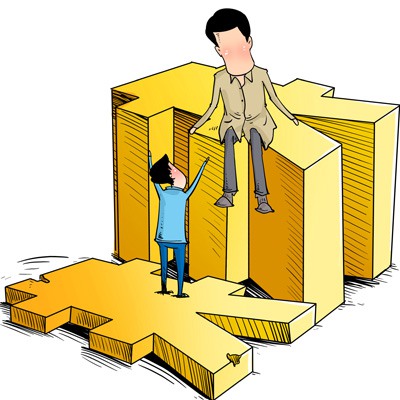|
 |
|
(CFP) |
The Third Plenary Session of the 18th Central Committee of the Communist Party of China (CPC) convened on November 9-12. Earlier, a survey was conducted on people.com.cn, revealing that income disparity is the most pressing issue among those surveyed. Approaching the one-year anniversary of the new CPC leadership's coming to power, it is expected that the Third Plenary Session will decide on measures and push forward reforms on income. The following are excerpts of expert opinions as drawn from the media.
Song Xiaowu (Economic Information Daily): Given the excessively large income gap, on one hand, some rich people are reluctant to consume or choose to consume abroad, while on the other hand, people of middle and low incomes, despite their willingness to spend, have little money to do so. This problem has already affected China's economic structure. Investment accounts for too much of the overall economic composition, sometimes even 50 percent. Meanwhile, domestic consumption is far below the world average. The expanding income disparity has also triggered complaints. Therefore, as we are at a transitional period between being a middle and high-income country, common prosperity should be regarded as a priority in income distribution reform.
In order to achieve common prosperity, first, we need to narrow the gap between rural and urban areas, including further raising of migrant worker wages and ensuring farmers' land based income. Second, it's necessary to narrow the gap between different industries and sectors, including cutting high incomes in administrative monopoly industries and increasing control over consumption by high-level managerial personnel. Third, it's important to raise the proportion of common workforce incomes. Organizations such as trade unions should be further developed. Worker interests are supposed to be protected through collective negotiations in line with market rules.
In terms of secondary distribution, the current problem is, after primary distribution, income distribution between rural and urban residents stands at around 3.1 to 1, but when urban social security and various public services are added, disparity expands to 5 or 6 to 1. We can not expect to correct all problems in secondary distribution overnight. As for social security programs, the Central Government has just put forward a framework according to which major principles and local governments are allowed to produce their own schemes. Rich places are encouraged to set higher social security standards, though at least one thing should be made clear, which is, that secondary income should not help further expand the gap created in primary distribution.
Zhu Lijia (The Beijing News): The Third Plenary Session means to further push forward reform on the whole. Reform of the income distribution system, which relates to all walks of life, is undoubtedly a priority. The biggest problem is how to break obstacles posed by vested interest groups. High-level managerial personnel in state-owned enterprises are paid too much, and their "invisible incomes" are not under any supervision and thus, not subject to tax rules. This is the focus of attention in today's society.
The public is concerned about how to narrow the wealth gap. Therefore, restrictions on welfare in monopoly industries, "invisible incomes," narrowing the income gap between rural and urban residents and pushing forward reform of the pension system, are all supposed to be covered by detailed measures. Take the pension reform system for example. Although the standard has been raised for nine successive years, most people are interested in when retirees from enterprises can enjoy the same pension treatment as civil servants and those who retire from public institutions.
Chi Fulin (The Beijing News): The difficulty in pushing forward reform of the income distribution system should be blamed on the left-behind reforms on taxation and house registration, or hukou, system. Take hukou system reform for instance: migrant workers bound for cities must pay for basic public services there, which affects their actual income level. Reform on income distribution must be pushed forward hand-in-hand with reforms on state-owned enterprises, the administrative as well as taxation and financial systems.
Tax measures are suggested, including further lowering individual income tax and adding more favorable policies for small and medium-sized businesses, as well as relieving middle-income groups.
|
